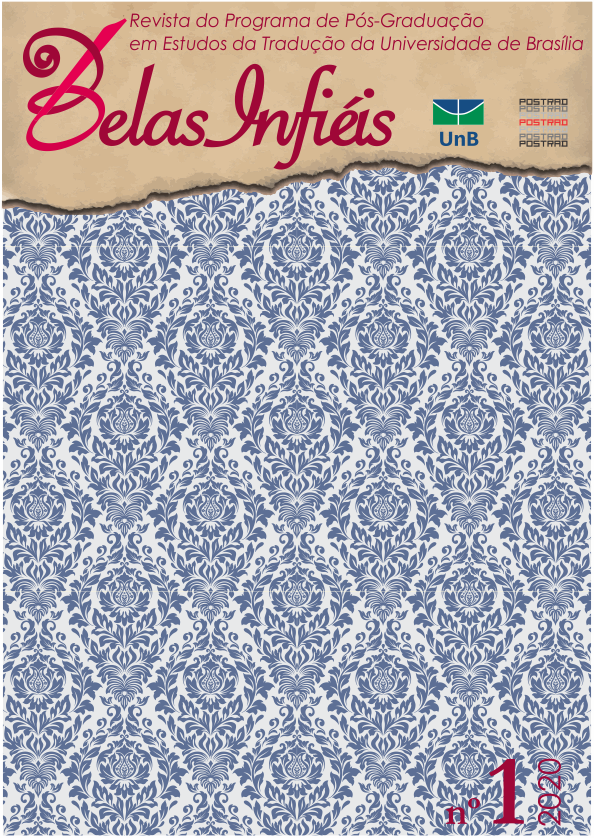The mixed iambic dodecasyllable: a proposal for the adaptation of the english epic blank verse into portuguese
DOI:
https://doi.org/10.26512/belasinfieis.v9.n1.2020.26766Keywords:
Blank verse. Accentual-syllabic meter. Poetic translation. Mixed iambic dodecasyllable. Binary rhythm.Abstract
The translation of epic blank verse usually takes two forms: formal adherence to syllabic counting as recreation of the pentameter as decasyllables, or semantic fidelity as adaptative transposition in free verse. Both modes cause detriment to the particular effects of the original form by not transposing to the target language the essential qualities of the English blank verse: the steady and constant rhythm and the tension between metric rhythm and the syntactic-semantic rhythm. In our essay we intended to study the qualities and effects that make epic blank verse distinct from other metrical forms, exploring the mechanisms of the iambic pentameter, its limits and mutations within the English tradition, and how this verse operates in unrhymed compositions of narrative and meditative character, in which the differences between prose and poetry becomes more subtle and the metric takes a character at the same time less marked and more fundamental. After this survey we propose a new variation of the blank verse in portuguese, the mixed dodecasyllable, composed of iambic rhythm, formed by the alternation between unstressed and stressed or half-stressed syllables, and headless dodecasyllables when the preceding verse possesses a feminine ending. We illustrate our study of the blank verse with excerpts from The Prelude, by William Wordsworth, and translate passages from the same work according to our metrical measure in order to determine its effectiveness. As a result we perceived that our adapted form appears to be capable of accomodating those qualities considered essential to the blank verse, reformulating in Portuguese poetic effects frequently lost during the process of translating English works, like the regular iambic rhythm and the reading momentuum poured integrally from one verse to the next. We thus concluded that a nontraditional approach toward the metrical potentialities of Portuguese, in dialogue with the forms of English poetry, is capable of opening new perspectives of translation for Portuguese language researchers, and bringing to light qualities of different metrical traditions that can offer new tools to their translators.
Downloads
References
ATTRIDGE, Derek. The rhythms of English poetry. London: Routledge, 1999.
JONES, David Keppel. The strict metrical tradition: variations in the literary iambic pentameter from Sidney and Spenser to Matthew Arnold. London: McGill-Queen’s University Press, 2001.
MILTON, John. Paradise lost. Mineola: Dover Publications, 2005.
MILTON, John. Paraíso Perdido. Traduzido por: António José de Lima Leitão. 1840. Disponível em: https://pt.wikisource.org/wiki/Para%C3%ADso_Perdido. Acesso em: 6 dez. 2019. Tradução de: Paradise Lost.
MILTON, John. Paraíso Perdido. Traduzido por: Daniel Jonas. São Paulo: Editora 34, 2015 Tradução de: Paradise Lost.
PEREIRA, Lawrence Flores. Nota sobre a tradução. In: SHAKESPEARE, William. A tragédia de Hamlet, príncipe da Dinamarca. Traduzido por: Lawrence Flores Pereira. São Paulo: Penguin Classics Companhia das Letras, 2015.
PEREIRA, Lawrence Flores. Nota sobre a tradução. In: SHAKESPEARE, William. A tragédia de Otelo, o mouro de Veneza. Traduzido por: Lawrence Flores Pereira. São Paulo: Penguin Classics Companhia das Letras, 2017.
SHAW, Robert. Blank verse: a guide to its history and use. Athens, Ohio: Ohio University Press, 2007.
SYMONDS, John Addington. Blank Verse. London: John C. Nimmo, 1895.
WEINFIELD, Henry. The blank verse tradition from Milton to Stevens: freethinking and the crisis of modernity. Cambridge: Cambridge University Press, 2012.
WORDSWORTH, William. O Prelúdio: ou o desenvolvimento do Espírito de um Poeta. Poema autobiográfico. Traduzido por: Maria de Lourdes Guimarães. Lisboa: Relógio D’Água, 2010. Tradução de: The Prelude.
WORDSWORTH, William. The prelude. In: WORDSWORTH, William. The collected poems of William Wordsworth. Ware: Wordsworth Edition, 1994.
Downloads
Published
How to Cite
Issue
Section
License
Given the public access to this journal, the texts are free to use but requires the recognition of the original authorship and initial publication in this journal to be properly stated.
 The journal allows the use of works published for non-commercial purposes, including the right to submit the work to publicly accessible databases. Published contributions are the sole and exclusive responsibility of the author(s).Â



















